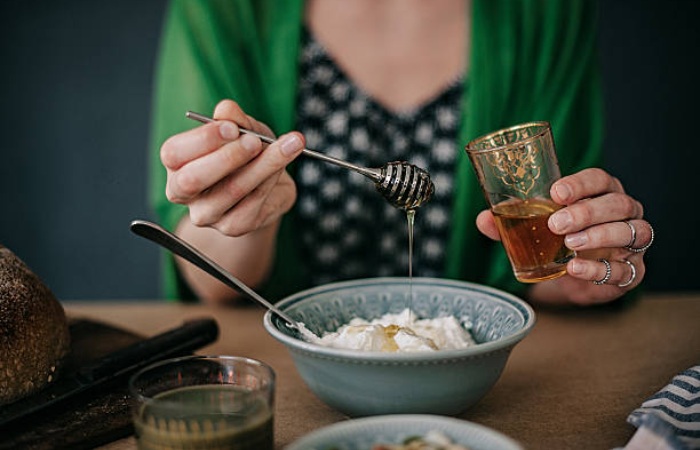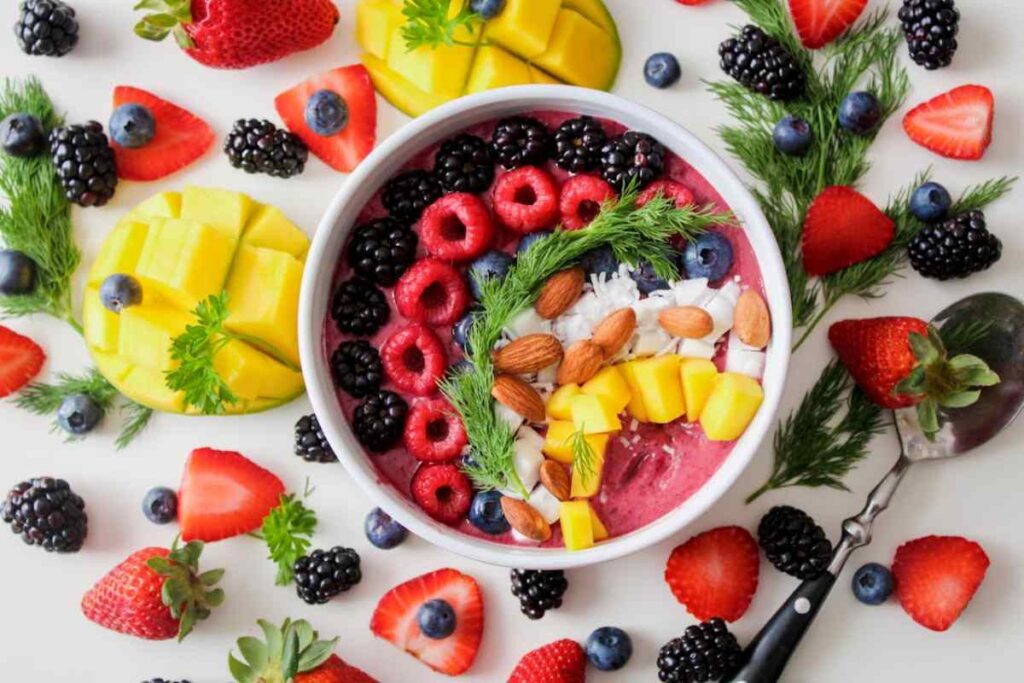Anxiety is one of the most common mental health conditions, moving approximately 7.3% of the global population Ease Anxiety.
It is an umbrella term used to label a variety of disorders, such as widespread anxiety disorder, social anxiety, and phobias. It is typically characterized by persistent tension, restlessness, and nervousness that can delay daily life.
In many cases, medications are often required as the primary course of treatment. However, there are several strategies you can also use to reduce anxiety symptoms, from exercise to breathing techniques.
Additionally, many foods you can eat can help support brain purpose and reduce the severity of your symptoms, mainly due to their brain-boosting properties.
Here are nine science-backed foods and drinks that can help alleviate anxiety.
Salmon Ease Anxiety

Salmon can help reduce anxiety.
It contains nutrients that indorse brain health, counting vitamin D and the omega-3 greasy acids eicosapentaenoic acerbic (EPA) and docosahexaenoic acid (DHA) (2, 3, 4, 5).
These nutrients can help control the neurotransmitters dopamine and serotonin, which can be soothing and relaxing Ease Anxiety.
Specifically, a diet rich in EPA and DHA is associated with lower anxiety scores. These fatty acids are supposed to reduce inflammation and stop brain cell dysfunction, which is common in people with anxiety.
It can also support your brain’s ability to adapt to change, allowing you to better cope with the stressors that cause anxiety symptoms.
Vitamin D has also been studied for its positive effects on reducing symptoms of anxiety and depression. A 2020 meta-analysis found that vitamin D supplementation was associated with lower rates of adverse mood illnesses.
In another study, men who ate Atlantic Ocean salmon 3 times a week for 5 months reported less nervousness than those who ate chicken, pork, or beef. In addition, they experienced improvements in anxiety-related symptoms, such as heart rate and heart rate variability Ease Anxiety.
Try adding salmon to your diet 2-3 times a week for maximum benefits.
Chamomile Anxiety

Chamomile is an herb that can assistance reduce anxiety.
It contains antioxidant and anti-inflammatory possessions, which may help reduce anxiety-related inflammation.
Although the mechanisms are unclear, chamomile is believed to help control mood-related neurotransmitters such as serotonin, dopamine, and gamma-aminobutyric acid (GABA) (16, 17).
It may also help control the hypothalamic-pituitary-adrenal (HPA) axis, a dominant part of the body’s stress response.
A few studies have examined the connection between chamomile extract and anxiety relief.
In a 38-week randomized trial of 179 people with generalized anxiety disorder (GAD), there was a significantly more significant reduction in indications after consuming 1,500 milligrams of chamomile extract per day associated with those who did not.
Another previous study from 2012 found similar results, noting that those who spent chamomile extract for 8 weeks experienced a decrease in symptoms of depression and anxiety. However, the study’s small sample size did not provide enough statistical power to demonstrate causality.
Although these results are promising, most studies have been conducted on chamomile extract. More recent studies are needed to evaluate the anti-anxiety effects of the most commonly consumed chamomile tea.
Turmeric

Turmeric is a spice that holds curcumin, a multiple studied for its role in indorsing brain health and preventing anxiety disorders.
Known for its high antioxidant and anti-inflammatory possessions, curcumin may help prevent brain cell damage associated with chronic inflammation and oxidative stress.
In addition, animal studies show that curcumin may be more effective at increasing the conversion of alpha-linolenic acid (ALA)—an omega-3 found in plants—to DHA and increasing DHA levels in the brain.
A double-blind, randomized trial of 80 people with diabetes found that taking nano-curcumin—a more minor, more bioavailable form of curcumin—daily for 8 weeks resulted in significantly lower anxiety scores compared to placebo.
Another small randomized crossover study found that taking 1 gram of curcumin daily for 30 days significantly reduced anxiety scores compared to placebo.
Although the results are promising, most studies have observed the belongings of curcumin supplementation rather than deriving curcumin from turmeric. Therefore, more research is needed in this area.
However, adding turmeric to your food is worth a try. To increase the absorption of curcumin, try combining it with black pepper.
Dark chocolate

Including dark chocolate in your diet can also help reduce anxiety.
Dark chocolate covers flavonols such as epicatechin and catechin, which are plant mixes that act as antioxidants.
Some research proposes that the flavonols found in dark chocolate may improve brain function and have neuroprotective effects. In particular, flavonols can increase blood flow to the brain and enhance the cell signalling pathways.
These effects can allow you to better adapt to stressful situations, which can lead to nervousness and other mood illnesses.
Some researchers also propose that dark chocolate’s role in brain health may be related to its taste, which can be calming for people with mood disorders.
A cross-sectional study of 13,626 participants found that those who spent dark chocolate had significantly lower symptoms of depression compared to those who rarely ate dark chocolate.
Additionally, an appraisal of nine studies concluded that consumption of foods high in cocoa may improve mood and affect in the short term.
While this is promising, more research is needed on the long-term effects of dark chocolate on anxiety and mood. Additionally, dark chocolate is best consumed in restraint as it is high in calories and easy to overeat. For best results, drink 1 to 1.5 ounces at a time.
Yoghurt

Probiotics, or beneficial bacteria found in some types of yoghurt, can improve your well-being, including mental health.
Although this is still a new area of research, probiotics may support the gut-brain axis—the complex system between the gastrointestinal tract and the brain. Specifically, research suggests that healthy gut bacteria may be associated with better mental health.
Additionally, probiotic foods such as yoghurt may promote mental health and brain meaning by reducing inflammation and increasing the manufacture of mood-boosting neurotransmitters such as serotonin.
According to one study, eating probiotic yoghurt daily for 6 weeks was associated with decreased anxiety, stress, and excellence of life in postmenopausal women.
Although this is a promising area of research, more human trials are needed to examine the direct link between yoghurt consumption and anxiety.
It’s also important to note that not all yoghurt contains probiotics. To reap the benefits of probiotics, choose yoghurt with live, active philosophies listed as an ingredient.
Green Tea

Green tea covers L-theanine, an amino acid that has been studied to positively affect brain health and anxiety.
In a double-masked, randomized study, participants who consumed a beverage containing L-theanine reported a significant reduction in subjective stress and lower levels of cortisol, a stress hormone associated with anxiety.
These effects may be due to the potential of L-theanine to prevent nerve overexcitation. Additionally, L-theanine can increase levels of GABA, dopamine, and serotonin, neurotransmitters that have been exposed to have anti-anxiety effects.
Additionally, green tea contains epigallocatechin gallate (EGCG), an antioxidant that promotes brain health. It may also play a role in reducing certain symptoms by increasing GABA levels in the brain.
Interestingly, the grouping of L-theanine, EGCG, and other compounds in green tea appears synergistic in calming and alleviating anxiety and may be more effective.
However, further research is needed.
Almonds

Almonds are an outstanding source of several nutrients that support brain function, including vitamin E and healthy fats.
Some animal studies have shown that almonds can reduce stress and oxidative inflammation, which may be associated with the development of anxiety.
Almonds may also have other mood-boosting properties.
For example, one study found that increased ingesting of nuts, including almonds, was related to decreased symptoms of depression.
Another study of 3,172 adults found that men who consumed the most nuts were 66% less likely to experience
nervousness than those who consumed the least. However, this association was not observed in women.
Therefore, better research is needed to understand how almonds may affect mood and anxiety.
Blueberries

Blueberries are rich in vitamin C and other antioxidants, such as flavonoids, which have been studied for their aptitude to improve brain health and alleviate anxiety.
A 4-week study found that daily wild blueberry consumption was associated with fewer self-reported depressive symptoms in 64 adolescents.
Some animal studies also propose that certain compounds found in blueberries may decrease oxidative stress and
improve symptoms of depression and anxiety.
Additionally, some studies have even found that increased consumption of fruits, such as blueberries, may be associated with a lower risk of anxiety.
However, more research is needed to evaluate the effects of blueberries on anxiety.
Eggs

Eggs are an excellent basis for tryptophan, a neurotransmitter that may be helpful for nervousness symptoms.
According to one study, an insufficient intake of protein and tryptophan—both of which are found in abundance
in eggs—may be associated with higher levels of anxiety.
Eggs also contain vitamin D, about 6% of the recommended daily allowance (RDA) in one large egg.
Some education has shown that low vitamin D levels may be related to increased symptoms of depression and anxiety.
However, while some of the nutrients in eggs may be beneficial, more research is needed to understand the effects of eggs specifically on anxiety.
Other foods that can help with anxiety
Although some of the foods listed below have not been studied exactly for their anti-anxiety effects, they are rich
in nutrients that are thought to improve their respective symptoms.
Meat and dairy: These provide high-quality protein, including essential amino acids, which produce the
neurotransmitters dopamine and serotonin, which can improve mental health.
Chia seeds: Chia seeds are an additional sound source of brain-boosting omega-3 fatty doses, which have been shown to help with anxiety.
Citrus fruits and peppers: These pods are rich in vitamin C, which has antioxidant possessions that can help
reduce irritation and prevent cell damage that can contribute to anxiety.
While these products can support your mental well-being, they should not replace any medication or other treatment your doctor prescribes.
Bottom line
Anxiety is a multifaceted mental health disorder that requires various approaches to manage it effectively.
Along with medication and therapy, the food you eat can help support your mental health, reduce anxiety
symptoms, and improve brain health. In particular, whole, minimally processed foods high in antioxidants appear beneficial.
However, there is not enough research to support the use of food as a first-line treatment for anxiety. Therefore, it should not replace any medication or therapy a doctor recommends.
However, adding these foods to your diet is an excellent way to provide brain health and overall well-being.


